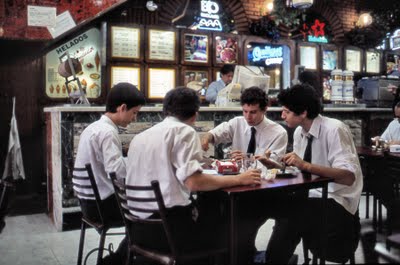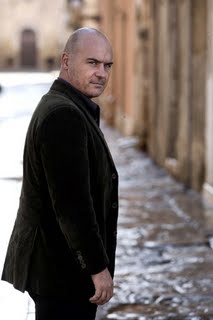The Exquisite Lethargy & Melancholy Of Fiacca
Sunday, December 06, 2009

fiaca.
1. adj. coloq. Arg. Perezoso, indolente, desganado. U. t. c. s.
2. f. coloq. Arg. Pereza, desgana.
Real Academia Española © Todos los derechos reservados
Saturday night when Hilary was sitting by the fireplace I put on some Piazzolla. I picked my favourite Piazzolla piece which happens to be Hilary’s favourite. It is La Milonga del Angel. Hilary likes it because it is melancholy, soft and romantic. Just like I sometimes like to put myself in a melancholy mood Hilary explained to a curious Rebecca, “I like la Milonga del Angel because it makes me warmly sad. And sometimes, like in these dark and cold nights, that is a good thing.” Rosemary stared at my sad face and said, “You are going to have to go to Buenos Aires, even if it is by yourself.” She knows we don’t have the money for such a trip but she recognizes Argentine nostalgia when she sees it.
It did not get much better on Sunday. Dealing with a plumbing problem in my darkroom was not a pleasant way to spend the afternoon as Rosemary struggled with mastering the inserting of pictures into her Word invoice that she was working for the school course she is taking these months.
Luckily I remembered that Patricia and Robert (my neighbours) have been inviting me to watch the Italian Salvo Montalbano TV series (based on the novels by Sicilian author Andrea Camilleri) every Sunday at 7:30. Patricia purchased a box set in the US of 16 episodes that have been a hit not only in Italy but in Australia!
They are around one hour and forty minutes long and they are slow to move as there is a lot of character development.
For me the show strikes my inside in an intimate way. I saw one Montalbano episode two months ago at the downtown Istituto Italiano di Cultura. I went with my friend John Lekich who was charmed by the fact that we were sitting next to an elderly Italian couple who were kibitzing the events as they unfolded. Luca Zingaretti, below, plays the shortish and stubby Inspector Montalbano to perfection. Not that I knew that when I first saw that first episode as I had yet to read the books. But once I had read all of the 10 (that have been translated from the Italian) that first installment set the scene to make my vision of Zingaretti as the only Montalbano.

As I watched last night savouring a beautiful Marks & Spencer tea (Robert is English) I was struck how certain stuff could never be made by North Americans or even the English. This series unfolds slowly with the subtlety of expressions in the protagonists. I almost don’t need to read the English subtitles (aside from the fact that some of that Italian sounds a lot like Argentine Spanish!). I can almost read their thoughts. I feel how they feel. The actors are full of a humanity that goes beyond the skin deep beauty of the women of the show and the handsome and womanizing Mimi Augello played by Cesare Bocci, who is Montalbano’s closest assistant. I left the show and as I was walking home I missed the heat of Buenos Aires summers (almost as stifling as the Sicilian ones) and the loud gesturing of the characters mimicked by Argentines who are not necessarily Italian.
The episode we watched last night was called Montalbano’s Croquettes (Gli Arancini di Montalbano) and is was quite seasonal as the action happens between Christmas and New Year’s. When I saw Montalbano’s cleaning lady and cook, Natalia, place her roundly pyramidal rice croquettes into her deep fryer I was suddenly hit by nostalgia for the croquettes that our Mercedes (our live in cook and cleaning lady in Buenos Aires) made for us. I do believe that our Spanish for crunchy, crocante, is a tad more special and effective in describing what goes one in one's mouth when one bites on a rice croquette.
I was also hit by lethargy to do nothing when I got home. In Argentina I would have said, “Tengo fiaca.” This means I feel lazy. A lazy person in Argentina is a fiacudo. A nearby town to where Salvo Montalbano works is called Fiacca in the series. I investigated and found that Camilleri simply changed the real costal town of Sciacca to Fiacca and indeed in Italian fiacca means exactly what it means in Argentine Spanish.
I look forward to more Montalbano in those slow days after Christmas and before New Years. I have already looked up a few recipes for croquettes. My Argentine nostalgia makes me long a slice of pizza (the smell of an Argentine pizzeria is in my memory of scents) at Las Cuartetas on Calle Corrientes. I caught the foursome at Las Cuartetas some years ago as I ate my porción (slice) parado (standing up). It is mandatory to find a pizza joint where you can eat your pizza in a hurry. If it is really good you will linger, eat it slowly and wait for the next big pizza to be removed from the oven. It was a Las Cuartetas where my father took me after an evening of Westerns on Avenida Lavalle. It was at Las Cuartetas that my two daughters (when they were in their late teens and early 20s) made a pilgrimage. They told the man behind he counter that their father and grandfather had often come to eat a slice. They told him that as a sailor their father had come up from his office near the Naval Ministry to have his pizza. The man behind the counter placed two very large plates of sopa inglesa (translates to English soup). He told my daughters that it was on the house. Ale and Hilary did not know that sopa inglesa is an Italian/Argentine version of trifle and that it is usually loaded with brandy. They left holding on to each other for balance.






